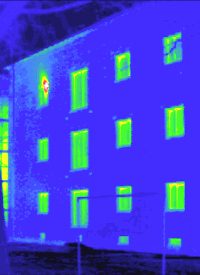
Under the guise of environmentalism, Boston is considering the installation of thermal imaging cameras throughout the city for the stated purpose of determining the energy efficiency of individual homes. However, the cameras also have the capability of showing activity within the homes of Boston residents, raising privacy concerns.
The cameras were developed by a firm called Sagewell, whose website explains the organization’s function:
Sagewell can prepare a private energy efficiency report of your home or commercial building. The reports are only available to building owners. Register to request a report of your building and our experts will help you take the next step towards energy efficiency.
The website also explains the benefits of thermal imaging. According to Sagewell, the images provide far more information than a visual assessment would, including whether insulation is missing from a large part of a wall, sill, or foundation, or if there is a substantial heat leak from two single pane windows.
Sagewell developed a program called 3E, “Efficient Energy Efficiency Programs,” which is currently being considered by the city of Boston. The company touts the benefits of the program as follows:
Until Sagewell, there has not been a cost-effective way to find the residential and commercial buildings that are most in need of energy efficiency improvements. Specific and detailed information on building envelope deficiencies has not been easily obtainable except through costly and time-consuming on-site energy audits. The scalability of these labor-intensive inspections is highly limited. For example, less than 40,000 audits were performed in Massachusetts in 2009. At the current rate, it will take over 60 years to reach all 2.6 million households in Massachusetts at a cost of over $500 million; not including the cost of actually remedying these buildings. Sagewell’s technology allows for the 2.6 million households to be evaluated at a fraction of the cost of traditional building audits.
The company contends that 20 out of 100 buildings are energy inefficient and would benefit from the thermal imaging program.
Boston’s WBZ-TV reports:
Boston officials had hoped to have aerial and street-level photos taken across about four square miles of the city this winter using infrared cameras that would show heat loss in the city homes.
Officials planned on sharing the photos and analysis with homeowners, and were hoping the findings would increase enrollment in efficiency programs and also create business opportunities.
The American Civil Liberties Union of Massachusetts has injected itself into the debate, however, worried that the infrared cameras are far too revealing and invasive, particularly as they are capable of taking up to 20,000 images of homes per day.
Lisa Van Der Pool of the Boston Business Journal explains:
The city has put the project on hold, at least until cold temperatures start up again, because of privacy concerns. The American Civil Liberties Union has raised concerns that these infrared cameras will reveal information about what’s going on inside of people’s homes. Presumably they’re worried about a little too much information being revealed and [there is] no word on how they’re going to address those concerns.
This is not the first time the ACLU has opposed the use of camera systems in large cities over privacy concerns. Earlier this year, the ACLU of Illinois protested the integration of a surveillance camera system in Chicago, claiming it posed a “pervasive and unregulated threat to privacy.” The group demanded that the system not be expanded until the city of Chicago imposed rules on the use of the system.
The use of invasive cameras is expanding and becoming more readily accepted — the TSA having already broken ground with its naked body scanners at airports around the country, with other longstanding invasive plans still in the works.
As reported by ConservativeFocus.com, for example:
Newly uncovered documents show that as early as 2006, the Department of Homeland Security has been planning pilot programs to deploy mobile scanning units that can be set up at public events and in train stations, along with mobile x-ray vans capable of scanning pedestrians on city streets.
Nevertheless, Sagewell’s thermal imaging plan is being touted as an environmental project, and has been initiated in towns outside of Boston. Environmental groups and utility companies in the Massachusetts municipalities of Springfield and Hamilton are already in the process of adopting the same project.
Photo: Example of thermal imaging.




